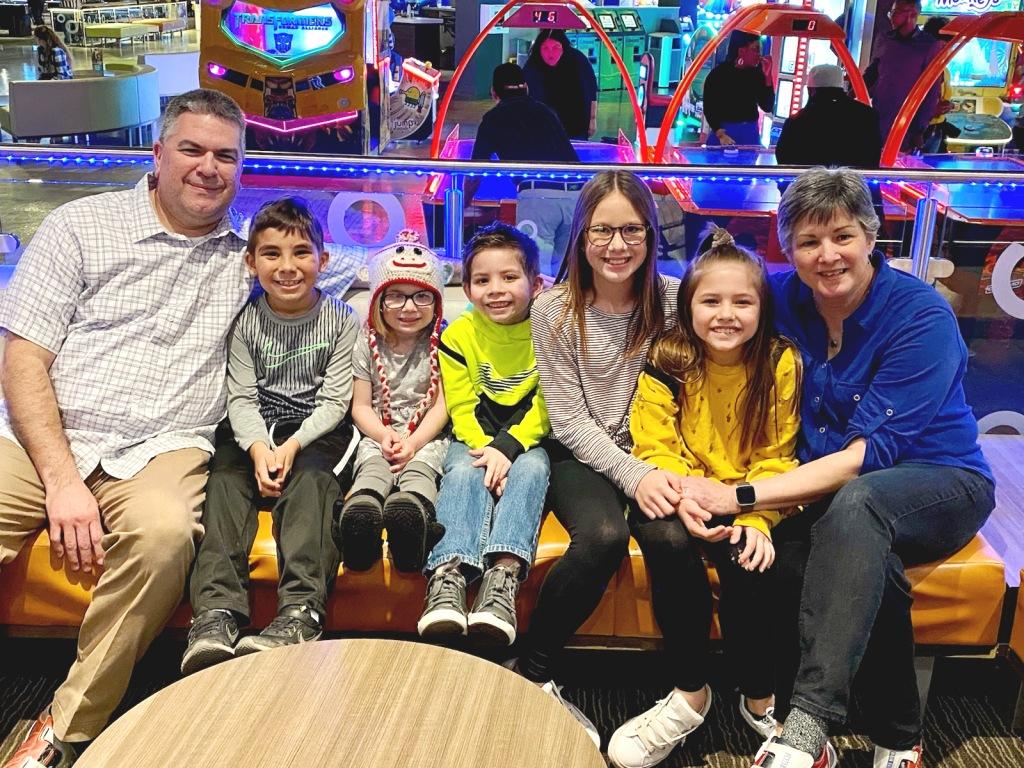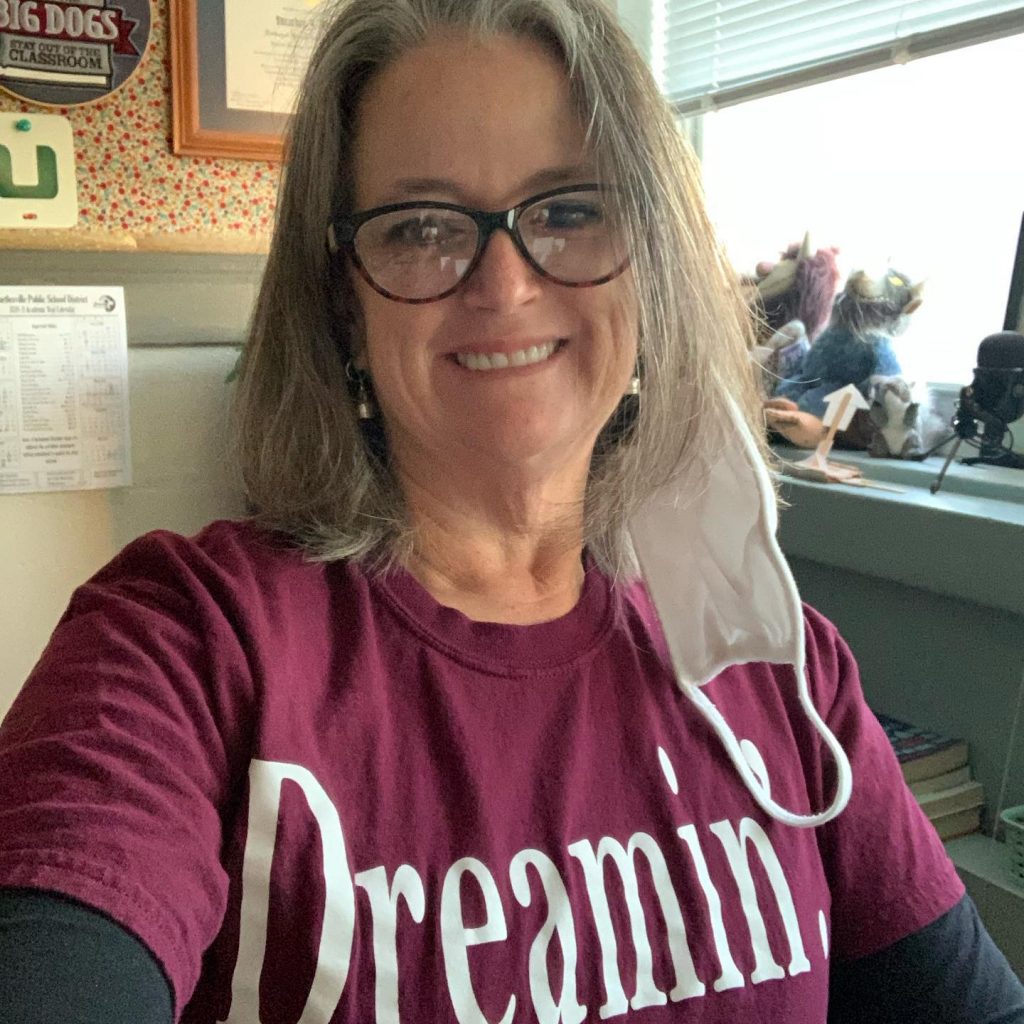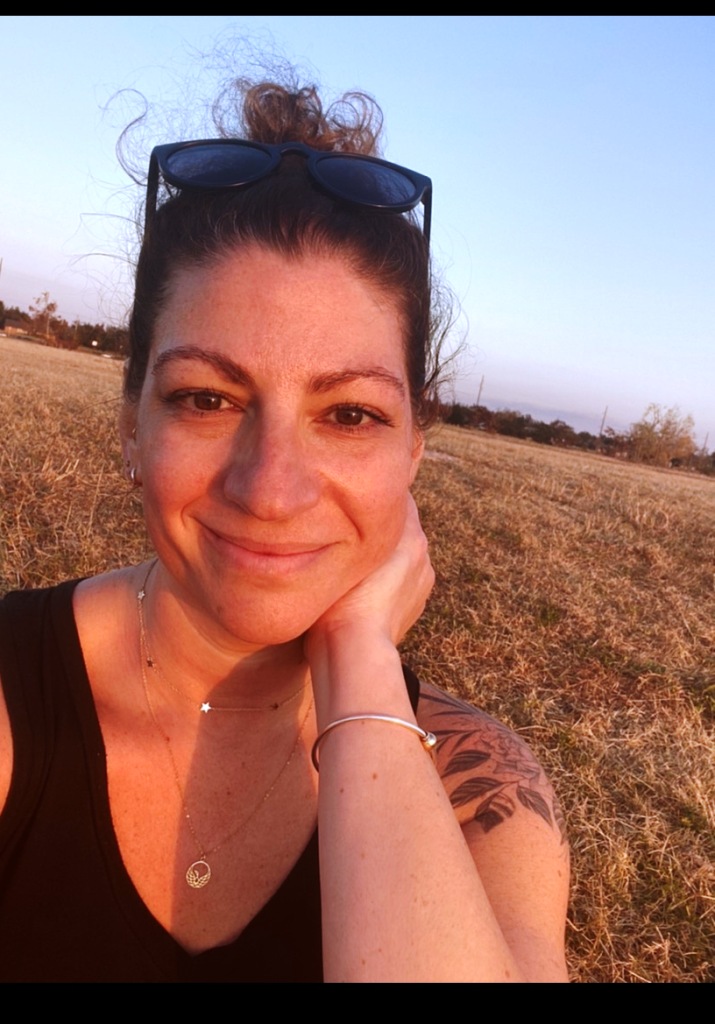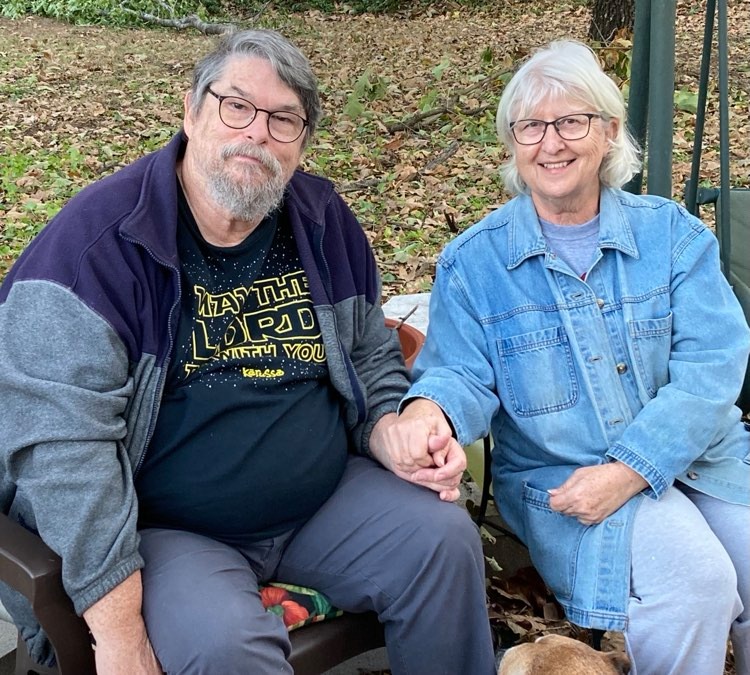Please say hello to my two favorite California residents and read about their year in pandemic. Their stories and insights were so fascinating, this story could easily have been twice as long. Grab a snack and enjoy!
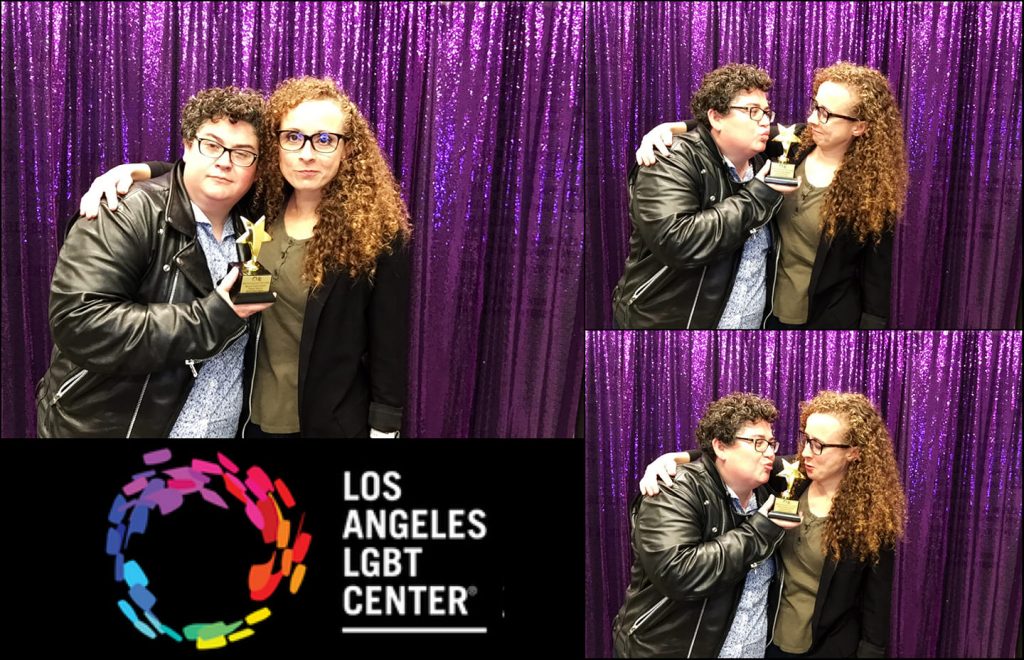
The first several weeks of 2020 were hectic and happy for Gen and Julia, each of them living their respective lives in their own Los Angeles homes, with their own jobs and cars and schedules, but enjoying plenty of overlap, too, because they are best friends. They had group lunches, work trips, book launches, a birthday party with cake and wine and silliness where Vince Vaughan made a memorable appearance, an outdoor concert, a book club meeting, and more.
They had heard a few reports of the new corona virus, but neither remembers thinking of it as anything more immediately threatening than, for example, Ebola or the swine flu. Then came the evening they both recalled, when otherwise normal hugs between friends suddenly felt uncomfortable.
That was one weekend in early March, and all of that lively momentum came to a screeching halt. Looking back on how much they were exposed to large groups then, they both agree, “It’s a miracle we didn’t get covid that week.” Their first big event cancellation was a traditional getaway to Arizona to watch MLB spring training, and it was a big disappointment to both girls. Lockdown came hot and heavy after that, slashing through season tickets for basketball and much more.
Julia spent three solid weeks holed up in her Los Feliz apartment, spending the first few days of shelter-in-place cancelling all of her imminent travel plans. She is a literary publicist by profession, and her 2020 schedule was already shaping up to be “bananas,” so there was a lot of travel upcoming. Undoing it all was a feat.
Gen’s last normal day of work was March thirteenth. She worked, then, at the Los Angeles Philharmonic, in the finance office. She remembers the environment feeling weird. First, they scrambled to decide who would be working remote. Then they scrambled to purchase enough laptops for those employees. It was uncharted territory for sure. Add to this, a colleague at the Phil lost her husband to the virus early on. LaTonya’s disabled daughter also contracted the virus, and though she survived it, her condition was serious. Everyone’s sensitivity was heightened.
We all remember those moments when the pandemic first felt real, and maybe we remember thinking it would only last for a couple of weeks. Gen and Julia are no exception. They were initially determined to wait it out, each on her own, hoping for a swift and healthy end to shelter-in-place. When infection rates swelled nationwide, lockdowns took on heavier meaning, and the end stretched farther and farther out of view.
On April 9, 2020, Julia also ran out of clean laundry, ha. So they combined resources and became roommates for the first time in their decade long friendship. They had stayed together a few times over the years, to help each other mend from surgery or illness or broken bones. Both retired LA Derby Doll skaters, convalescence was familiar territory for these ladies. But rooming up in healthy times was new. All they had to worry about now was a deadly virus. Julia packed one huge suitcase, filled mostly with her books, left her apartment vacant. More than one year later, they are still enjoying good chemistry and making lots of happy memories.
Julia chose to not shop right away. She had enough dry goods to wait it out for a few weeks and wanted to avoid crowds at all costs. Gen had lots of frozen foods already but did collect a few shelf stable additions. She chuckles now at her early choice of Pepperidge Farms smoked sausage, something she doesn’t normally even eat (You are not alone in this, sister, lots of people did this). Her known snacking weakness is a large carton of those tiny Goldfish crackers every few days (I am seeing a Pepperidge Farm theme here), but she denied herself this pleasure. Instead, she soothed her nerves with chips and salsa like a good born and bred Oklahoma girl. Julia’s stress snack was, and this delighted me very much, Jack Daniels. (I feel like Hemingway would be proud.)
Masks were an easy yes for the Golden Girls of Pandemic. They wore scrappy, homemade first runs made by yours truly. They bought surgical masks and K-N95s online, and they found cute crafty ones, too. Gen is an avid runner and often wore a neck gaiter for easily slipping up over her mouth and nose. For a time, they wore two masks at once in public. Will they continue to wear masks after pandemic? “Yes, I hope so,” they agreed, especially “when we are sick or traveling.”
We chatted about all the many unknowns in those early weeks. They conveyed such gravity and humility about their place in the world. As Julia put it, they aren’t medically trained or emergency responders or of use in any essential service, so, “The only thing we could do to help out was not get it and not spread it.” The way she spoke that, with the gentle tone of helpless surrender, made me ache.
Gen’s handsome little bungalow is located in a densely populated historic neighborhood, where she knows and socializes with many of their neighbors. They all look out for each other in normal times, and this past year has underscored that bond. For two months the neighborhood soundtrack was almost nonstop emergency sirens. Ambulances came and went every day. It was stressful and sad, and the sounds echo, serving to illustrate in real, human ways the cold facts of local statistics. It kept everyone on edge, no matter how much they isolated strictly at home. “It was scary,” Julia said.
Despite the outside worries and stressors of not just the virus but also the raging political and social storms, daily life on the inside of their home seems to have been blissful, overall smooth and productive for these retired Derby girls. They each had plenty of physical space for working on their laptops then stretching out to rest and read. For a while, they used a spare bedroom and some creative sound blocking materials so Julia could record her podcast. Gen spent some time nibbling away at home improvements, though admitted to often being “frozen by indecision.” She told me about a few unfinished projects and noted with gentle self deprecation, “There was a lot of sanding of wood.”
Over the months, their food repertoire expanded greatly as Julia took over much of the cooking duties. In fact, it was more than duty. Julia came to relish 5:00 p.m., the predictable time of day when she could walk away from her laptop and lose herself in the kitchen. They ate Italian food made from scratch and cooked flash frozen seafood delivered from Santa Monica. They experimented with baking and red beans and rice and vegetable pot pies, perfected sourdough pizza crust, and much more. Gen cooked too and was happy to clean up after their frequent feasts.
The girls obviously did a good job building routines that supported their mental and physical well being. Living according to deliberate structure comes naturally to Gen, and it served them both well this year. Julia took to regular long walks, outdoors when possible then on the treadmill when infection rates were too high to risk being in small alleyways. Likewise, Gen ran plenty, sometimes more miles than before thanks to the time saved by no longer commuting to work. They found a comfortable domestic rhythm, and this made all the difference in preserving, and maybe deepening, their friendship.
Through all of this, the Golden Girls of Pandemic stayed proactively connected to friends and family via, you guessed it, Zoom. Julia’s Mom lives in Santa Cruz, much of Gen’s family is here in Oklahoma, and their friends are all around the globe. I appreciated their honesty about how average life updates soon felt mundane, because everyone was always doing the same stuff, over and over, ha. Their solution was to grow one of their standing Zoom gatherings into monthly game nights, just to stay connected. That is cool.
These two women are bookworms of the highest order (hashtag cool nerds), so I was interested to hear how pandemic affected this part of their lives. Gen read as much as ever, though not everything she tried held her attention. I will personally add here that pandemic afforded our family of origin a unique motivation to read the same books, I think because we were checking in with other more often. Gen took the lead on this, and one month last summer will go down in family history: Almost all of us, including both of our parents, read Where the Crawdads Sing then had a long Zoom about it. We read others and will continue this new tradition, but I will forever be thankful for that particular book and the excellent conversations it started between (almost) all of us.
Julia’s usual setting for diving deep into a book is either a crowded bar or an airplane. With neither available all year, she had trouble relaxing enough to read for pleasure. Sometimes the YA genre grabbed her better. No worries though, she was able to read all of her books for work and the two book clubs she leads. Certainly, that is still a lot of reading.
As for other media consumption, they were pretty indulgent and even figured out a system for trading the remote control back and forth. They watched The Crown, The Americans, and Six Feet Under, the latter of which they both said was “Oh… so good!” On Super Bowl Sunday, since neither of them cares for football but “It is the one true American holiday, when un-athletic people sit and yell at athletes on television,” Julia asserted, they assembled a table filled with all the best dips and appetizers and binged gluttonously on Bridgerton. That is to say, they watched the entire series in exactly one day. “We kept a butt count.” Gen exploded into laughter at this admission and was even able to supply the episode number when the most butts appeared, in case I needed that. (Thanks weirdo, no.)
Pandemic served both of them professionally, just in different ways. For Julia, once she accepted and overcame the challenges of recording a podcast from home, she thrived. And it was overall a good year for the world of literary publishing, notwithstanding the monumental jam up when President Obama’s book The Promised Land went to print. Julia and a friend and colleague also managed to finish and publish their own book this year, which is pretty amazing.
Gen thrived too, working steadily from home all year, but the unique environment brought into focus some underlying management problems at her firm, things that pre-pandemic life had kept a little bit hidden. She gained the perspective she needed to give her notice toward the end of 2020 and started job hunting. Her standards were high, as they should be, and her patience paid off. After a few long months of searching, interviewing, and weighing options, she found her dream job, which she started yesterday.
I asked the golden girls for their opinions on how their local government handled the outbreak and what they feel could have been done better. Gen and Julia agreed that California, and specifically Los Angeles county, initially seemed responsive enough. Then pockets of the population grew resistant to mask wearing and sheltering in place. These groups gained noise and momentum and asserted their need for personal freedoms. Eventually the Governor “caved” on important restrictions like indoor dining. Gen and Julia were disappointed but, predictably, stayed their own course. The wobbly backbones exhibited by local leadership may or may not warrant removal from office while they continue to serve, but they will definitely change the voting plans for many citizens.
Feeling at odds with other people was especially tense during the winter months, when infection rates were up. Everything, it seems, was more tense then.
Their mental health faced challenges like anyone’s. Gen felt hers rise and fall a little but said most days were regular or average, and she is definitely grateful. She still had “some crap days,” as called them, ha. But she shrugs those into the periphery.
Julia said she “hit a wall in November and December, I was just at emotional capacity.” Besides the covid pandemic and intense political climate, which she aptly described as “chaos on all levels,” she was still grieving the loss of her Dad almost a year earlier. Her family had to repeatedly delay his celebration of life (as of this writing they hope to gather safely in April 2022), and that hurt. The Santa Cruz County high school where he taught classes did host a small event just before the holidays. It was all such a depth of emotion to churn and stir and simmer, all while getting through the holidays and staying safe in some of LA’s weeks of most widespread infection. It is no wonder to me that she hit a wall then. But she is bouncing back.
For two adults who so faithfully adhered to the CDC safety protocols, I was curious whether they ever needed to quarantine for specific exposure reasons and whether they ever needed medical attention not related to covid. The answer to both questions was yes, for both ladies.
Julia voluntarily quarantined even harder than usual, for the two weeks preceding her trip to Santa Cruz, to attend her Dad’s school memorial. Gen, frustratingly, learned that on her final day at the LA Phil, when she made a brief appearance to tie up loose ends after working so many months from home, she was exposed to a colleague who tested positive. So she had to quarantine after that. Thankfully, neither Gen nor Julia ever contracted the virus.
As for needing normal medical attention in the midst of this crazy year, their stories are memorable: Julia cooked shellfish one night, and Gen broke her tooth eating it (worth it). So that earned her a trip to the dentist (still worth it). Another painful sounding kitchen injury: Julia was rehydrating dried chiles and burned the skin on her stomach so badly she was worried about infection. This and an unrelated episode of a stye in her eye were both treatable via Telehealth consultations. A miracle of modern connectivity!
Gen and Julia both acknowledged that throughout the year they found themselves “cracking up on the same day,” which had to be interesting. Things are definitely looking up now.
I love my sister and her best friend both so much. Over the years I have joked about Julia being our surrogate Los Angeles sister. There is a lot of comfort in knowing they are close to each other, though far from us. And though they are younger than me, I often catch myself glancing toward them in my thoughts, for a bit of leadership. The coin of affection is protectiveness and love on one side and admiration and curiosity on the other. Gen thinks so clearly, has such calm, steady methods for sifting fact from fiction and for magnetizing good information from all the noise. And Julia is so layered and passionate. As pandemic wore on and global realities evolved month to month, our family Zooms and group chats sometimes included talk about politics and which news sources to trust, and I appreciate that so much.
I asked for their reflections over all, for their big picture perspective on life after this experience. Gen, a true contemplative, was geared up with her answer. She said that pandemic and isolation have offered her an opportunity to “think about the why of things” in her life. “What is friendship? Why are people friends?” Julia chimed in that they had lots of time to more deeply discuss politics, race relations, and myriad social issues. These were fruitful conversations.
They also shared with me that, and this is where they lost me, they spent lots of time talking about farts.
Okay. Wait, farts? Yes, and other bodily functions.
This was about the moment when my otherwise serious interview subjects started laughing like seventh graders, something about Capri Sun lemonade being spat out one day and maybe there was a microwave involved? They were both laughing so hard at this inside joke that their faces turned red and their speech devolved into squealing. I tried laughing with them, but I was 100% laughing at them, laughing uncontrollably. The fact finding was clearly over.
There is no End,
There are Only New Beginnings
XOXOXOXO
